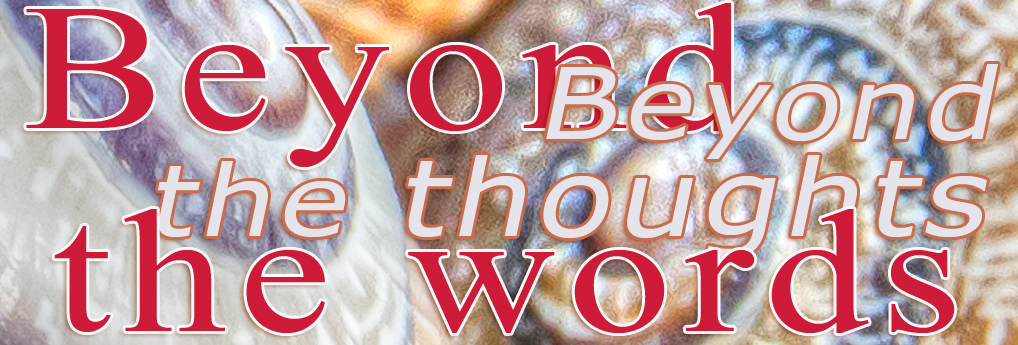A woman who once came to me said, „When my 15-year-old daughter brings her friends home, I take all my angel figurines out of the living room closet and hide them in my bedroom. My daughter is embarrassed if her girlfriends would see them. And I’ve grown uncomfortable with it, too.“ Wouldn’t it be nice if this woman could leave her figurines standing and that when her daughter’s friends laughed at them, she would have words available that could make these young people understand what these figurines mean? If she could say, „Well, girls, the thing about these figures is that they are XYZ. And because they are XYZ, they are ABCD to me.“ And the girlfriends would then – maybe – say, “ Oh, that’s how it is. Then we understand that. That’s wonderful.“ Unfortunately, the terms „XYZ“ and „ABCD“ do not exist in our vocabulary. So the woman has only the following to say when her daughter’s friends – already whispering and grinning – ask what the angel figures are all about: „They are beings I believe in, and because I believe in them, they help me in difficult situations and are my companions.“ Now every child from a certain age knows that it is not far with the faith already with Santa Claus. The word „believe“ somehow contains something negative. Faith somehow lacks facts. It seems to be determined by wishful thinking, by childish fantasies with which one imagines reality beautifully. „Faith“ or „believe“ always has something inane about it. Something is wrong with it. In case of doubt, it is absolute nonsense, which someone convinces himself of in order not to have to look reality in the unfriendly face. There is something weak in it. Even something comfortable. When I believe, I don’t strive for knowledge. I avoid the facts. Faith is NOTHING in contrast to the knowledge which appears precise, unassailable and clear! „Do they only believe that or do you know that?“, „They don’t believe that themselves!“, „What do they believe, who they actually are?“, „Can they make me believe that?“ „I can’t believe it!“ „Who is supposed to believe that?“ The doubt is in each of these sentences. So it’s immediately absolutely clear to these girls with their 15 years of life experience that this somewhat over-strained forty-year-old older lady probably can’t quite cope with the world anymore and is saving herself in some moronic angel-figure dreams to escape reality. „And she still believes that! Maybe she even talks to them! Ouch!“ – You can’t blame the girls, now that they’re out of the Barbie age and, after all, it’s already been made clear and obvious to them what the life achievement trajectory in our society is like. There is no room for children’s nonsense like little dolls if you want to have a nice secure office job. „Man, the old people are really getting weirder and weirder. I hope we don’t become like that one day. Let’s go shopping and then chill out in the café for a while. She ís‘ creepy!“ Do they recognize the really creepy thing about it? Our mind has managed to install the term of „faith“ (occupied as inferior, childish and stupid) as a technical term for EVERYTHING soul-spiritual. Even the church as a faith community accepts this term, although it would have to say: „It is a deep KNOWLEDGE which lies in the mysteries and ONLY there! You are welcome to BELIEVE in your salvation in material consumption, but you cannot attain KNOWLEDGE that way!“ But she doesn’t. It is satisfied with the fact that its members are „believers“ and not „knowers“. During one of the last papal visits, a newspaper said, „What will he talk about? Politics or private matters?“ When I read that, I wondered, „Isn’t he supposed to talk about God and only God?“ Shouldn’t he make us „knowers“? Thus, the mind as the creator of language has managed over many generations to dedicate the (good, clear, incorruptible and unambiguous) concept of „knowledge“ to its „science“ and thus to the material and tangible world determined by cause and effect, while everything else became a matter of faith (i.e. nonsense). And this is how we think and feel. And so I was once told that it was embarrassing to talk about the soul after all…. Isn’t that sad?
It is also said that he has a strong faith.
You would never say someone has strong knowledge.
Knowledge one has or one does not have. It is there or not, but it is certainly never weak or strong. It is absolute. That is how it is thought.
In our society, having a strong faith somehow means that the person concerned very tenaciously and stubbornly holds on to his childish imaginary conception of the afterlife and God, although this fantasy conception enables him to perhaps endure many injustices or to do good under adverse circumstances. He then does something. Honorary, so to speak. And for free. Reward is in heaven. How practical!
And therefore one can show something like religious respect (indulgence) to this action. Then one does not have to label the believer immediately as an unproductive dreamer or even as a freeloader and can babble about strong faith. Or something similar. – In any case, this works as long as you don’t feel disturbed by this believer in your own life. Otherwise, of course, one would have to quickly put an end to this dangerous nonsense.
